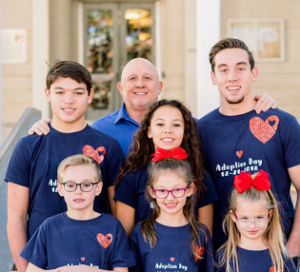February/March CASA Volunteer Spotlight: Joe Gibson
THE 2018 CASA ROOKIE OF THE YEAR, Joe Gibson, shares his own thoughts on BEING AN ADVOCATE FOR CHILDREN in foster care
 CAN YOU TELL US, IN YOUR OWN WORDS, ABOUT WHAT PROBLEM CASA ADVOCATES HELP TO SOLVE?
CAN YOU TELL US, IN YOUR OWN WORDS, ABOUT WHAT PROBLEM CASA ADVOCATES HELP TO SOLVE?
Advocates are the personal and trusted link from the child to the judge. As the eyes and ears of the judge and the professionals involved in the case, the Advocate brings more than facts; they bring all that encompasses the needs of the child. This includes addressing the child’s current feelings, struggles at the placement, potential and current issues at school, all the while watching for distress from current or past hurts.
One 6 year old child who suffered the loss of his home with his parents, then the death of the custodial grandparent was in terror by the more-than-adequate, but strange-to-him new foster home. As an Advocate who knew the child from the kinship placement, I recognized an immediate need, contacted the professionals to make them aware of the situation, and within a few days they were able initiate a placement with a family familiar to the child. It was assuring to me to visit the child and no longer see him cowering with fear and withdrawal.
How did you first hear about casa?
I saw a billboard on Highway 105 [outside Conroe] advertising CASA. The billboard featured Laura Bush. She was asking volunteers to make a difference in the life of a child.
What attracted you to this cause?
My wife was a foster mom before we married. She adopted three children that are now my stepchildren. She shared with me her children’s early struggles. This made me aware of how I might make a difference in children’s lives today, and I joined CASA.
DID YOU HAVE ANY RESERVATIONS ABOUT BECOMING AN ADVOCATE?
I am a passive person. I avoid conflict. As a CASA Advocate, I knew that conflict would be the foundation of every single foster child’s situation. This made me doubt my ability to be the right person for the job. Little did I know that the ability to approach conflicts carefully and prayerfully with a peaceful and gentle mindset would become my strength.
CAN YOU DESCRIBE HOW YOU FELT WHEN YOU WERE FIRST SWORN IN AS AN ADVOCATE?
When I was standing before the judge being sworn in, it was a good feeling that I would now be able to help kids. Yet, the heavy realization set in that this was a tremendous responsibility.
HOW DID YOU FEEL WHEN YOU TOOK YOUR FIRST CASE?
Because of my insecurities, I felt good that the case was to be an “easy” one. The child was in College Station at a residential treatment center. The distance would only require visits once every six months. However, the same day I was assigned to the case, I received notice that the child was moved to a local center. “Easing” into the Advocate role was not going to happen to me. To this day, I can recall every detail of this child’s situation, as well as the outcome. His reuniting with his now-healthy family was my hope, and it became a reality.
WITH SO MANY WORTHWHILE ORGANIZATIONS TO SUPPORT, WHY SHOULD OTHERS CHOOSE TO SUPPORT CASA?
Everyone who has clear memories of their childhood, been a parent, or is familiar with children can identify with the need for a safe and healthy home environment. CASA offers the blend of a person’s past with professional training that can appeal to and qualify most people to be an Advocate.
WHAT HAVE YOU LEARNED ABOUT CHILDREN IN FOSTER CARE?
No matter how extreme the circumstances, there is a deep desire to be with their original family in a safe environment. As an Advocate, once/if the realization sets in that the original home cannot be a safe place, the child needs support, comfort and love in identifying that new place. This may be with other family members or foster families.
WHAT WAS MOST SURPRISING TO YOU ABOUT THE ROLE OF AN ADVOCATE?
I am still surprised how my weakness to avoid conflict has become a strength and an effective tool for bringing about the best in extremely difficult situations.
IS THERE ARE PARTICULAR MOMENT OR MEMORY THAT STANDS OUT FOR YOU?
For me, every single successful reuniting with the original family is an indelible memory. Next, every adoption brings details of the children’s faces to my mind, starting with the first visit. The fearful, pain-ridden expressions. The soft, rhythmic rocking motions and the distant look of withdrawal, that formed from the horror of their past. Over months and sometimes years, the transformation is remarkable to observe. My heart is deeply moved when the new forever family stands before the adoption judge. The images of misery and fear then replaced by hope, joy and love. Each of those children’s names and faces are locked into my memory.
IS THERE AN ACHIEVEMENT OR CONTRIBUTION THAT YOU ARE MOST PROUD OF?
When I am able to do something that matters for the child as an individual, I am most proud of that achievement. In an effort to find an unstructured, comfortable place to conduct a visit, I chose to attend the children’s athletic events. I receive the best rewards from watching the youthful batter, the football player and the volleyball setter. I welcome getting a hot, stinky, sweaty hug from my teenage foster child after his football game and seeing her glance from the volleyball court and his wave from the baseball field to me in the stands. They acknowledged I was there for them. No public award could match these achievements.
WHAT WAS THE BIGGEST CHALLENGE YOU HAVE FACED AS A CHILD’S ADVOCATE?
The most challenging aspect of being a child’s Advocate is the speed at which the system moves and conveys critical information to those who have immediate need to know. One example is when a child changes placements and schools one day, but paperwork takes weeks or months to get to the new school. This is when the Advocate’s visit to the school is most important. For one of my children, physical confrontations were avoided by communicating a child’s history to the counselors and teachers. Providing the teachers with important information about the child can help the teacher understand why the child may be passive, withdrawn or act out in class. This information is critical to allow the schools to provide the best support to a child in crisis.
WHAT WOULD YOU SAY TO SOMEONE CONSIDERING BECOMING A VOLUNTEER ADVOCATE?
I would tell someone considering becoming a volunteer Advocate to be ready for a life changing experience. As an Advocate, your investment of time and effort impacts the lives of deserving and needy children – what can be more rewarding?
IS THERE ANYTHING ELSE YOU WOULD LIKE TO SHARE WITH US?
The Advocate can be the single constant person in the child’s life. Caseworkers, attorneys, judges, foster homes, treatment centers, schools, and neighborhoods (sometimes hundreds of miles from their original home) can change more than once in the same year for the child in foster care. Even the best attempts to reunite the family may fail causing changes in foster placement. The CASA Advocate can be the person who stays with the child throughout the entire time they are without a permanent family. One teenage girl, upon learning of her upcoming transfer hundreds of miles from Montgomery county to an R.T.C., pleaded with me. She asked, “Will you still be my Advocate?” It matters to the child that the Advocate who knows them will be there for them, especially when they move from home to home.
See Joe and some of the children he has served as an advocate in this video:
EVERY CHILD DESERVES A CHANCE…IT’S YOU!
Learn more about becoming a CASA volunteer: VOLUNTEER or give online: DONATE.
